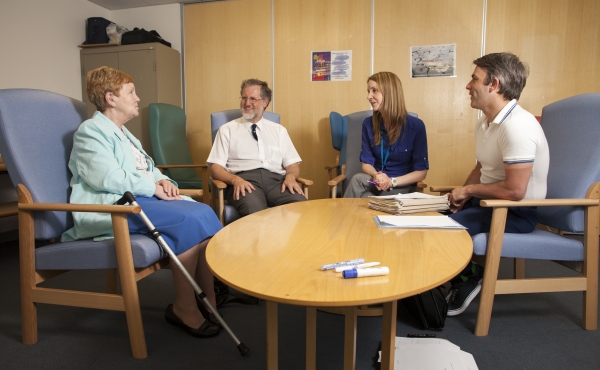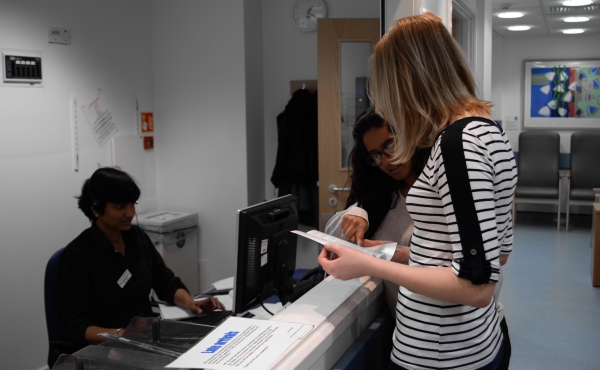What is a Pain Medicine doctor?
Comprehensive, patient-centred care
Pain Medicine Specialists are doctors who are specially trained, qualified and revalidated so that they can offer integrated, expert assessment and management of pain using their own unique knowledge and skill set usually within the context of a multidisciplinary team.
Where do we work?
Most Pain Medicine Specialists are hospital based, though some work as specialists in the community or other healthcare settings such as GP practices. Increasingly they work in the community providing care closer to their patients.
How are we trained?
The most common route to become a Specialist in Pain Medicine is via an initial specialisation in anaesthesia. The vast majority of Pain Medicine Specialists will have undertaken Pain Medicine training as a part of the Fellowship of the Royal College of Anaesthetists (FRCA) and the Certificate of Completion of Training (CCT) in Anaesthesia award by the GMC.
In addition, the majority of Pain Medicine Specialists demonstrate their continuing development of high level standards by joining the Fellowship or Membership of the Faculty of Pain Medicine of the Royal College of Anaesthetists (FFPMRCA or MFPMRCA).
Revalidation and continuous training
As with all GMC registered doctors in the UK, Specialists in Pain Medicine complete GMC revalidation in order to maintain a licence to practice. As part of that rigorous process they are required to maintain up to date knowledge and competency and are assessed against standards defined by the Faculty of Pain Medicine of the Royal College of Anaesthetists and published as The Good Pain Medicine Specialist.
The Faculty of Pain Medicine also publishes a Core Standards document, which prescribes standards and recommendations for healthcare professional and pain management services. These standards may be considered during Care Quality Commission inspections.
What types of pain do we treat?
- Acute pain relates to pain occurring during tissue damage and repair for example during sudden illness, surgery, trauma and burns. The pain typically improves with tissue healing.
- Chronic pain is a persistent pain, which continues after healing or is the result of on-going damage and includes spinal pain, post-traumatic pain (e.g. after amputation or surgery), pain involving the central or peripheral nervous system (e.g. post stroke pain, complex regional pain syndrome, diabetic neuropathy, post herpetic neuralgia and sciatica) and pain associated with other chronic diseases such as angina, arthritis, endometriosis, headache and pancreatitis.
- Cancer pain encompasses any pain in patients with cancer that is caused by the cancer or associated with the treatment.
What other specialists do we work with?
Because of the wide range of conditions that they manage, Pain Medicine Specialists have to work closely with healthcare professionals from other medical and surgical specialties. Pain management is often provided concurrently with other treatments provided by different healthcare teams. We work closely with a range of other healthcare professionals including nurses, clinical psychologists, physiotherapists, occupational therapists and pharmacists. This multidisciplinary working is a fundamental requirement for effective patient care. Doctors who work as a Pain Medicine Specialist will show leadership skills in this multidisciplinary team. Interdisciplinary.
What do we do with our patients?
Doctors trained as Pain Medicine Specialists undertake some or all of the following when managing a patient:
- Comprehensive assessment of the patient (including physical complaints, functional limitations, psychological status and the occupational and social impact of the pain)
- Physical examination
- Review of investigations
- Ordering of new investigations
- Formulation of a management plan
- Communication with all relevant healthcare professionals and carers
- Onward referral to other healthcare professionals if appropriate
- Prescription of medication, performance of interventional procedures
- Referral for physical or psychological techniques
- Appropriate discharge and follow-up plans
Communication is key
Pain Medicine Specialists have to possess good communication skills when working in the multidisciplinary and interdisciplinary settings. They aim to promote the understanding of pain mechanisms and evidence based treatments to patients, the public and to other healthcare professionals. Providing information and enhanced understanding for patients is an important element of successful pain management.
What techniques do we use?
Pain Medicine Specialists utilise a broad range of treatments which include, but are not limited to:
- Pharmacological: analgesics along with a range of other co-analgesic and adjuvant medication used for treating a wide variety of nociceptive, neuropathic, visceral and other long-term pain syndromes.
- Analgesia: Pain Medicine Specialists may prescribe a combination of analgesics including specialist medications focused on pain caused by nerve injury. Unfortunately for some patients with chronic pain analgesia may have little or no effect and so medication may also be reduced and stopped to prevent harm.
- Interventional techniques: Pain Medicine Specialists may perform injection into muscles, joints, the spine and around nerves to temporarily relieve pain as part of a wider strategy to manage the effect of a patient’s pain on their ability to function. Pain Medicine Specialists may also train to implant pain–relieving devices into selected patients for a small group of chronic pain conditions (e.g. spinal cord stimulation and implanted spinal drug delivery systems).
- Physical therapy: physiotherapy and occupational therapy designed to build strength and flexibility, improve mobility and reduce disability.
- Psychological therapy: ranging from individual and group based support and education sessions through to hospital based psychological therapy. This is designed to reduce the impact of the pain on an individual’s mood, well being and social interactions.
Special interests
Some Pain Medicine Specialists concentrate upon specific areas such as paediatric pain, genitourinary pain, visceral pain, cancer pain or neuromodulation (including spinal cord stimulation).
Want to know more?
Browse our range of patient information leaflets.



